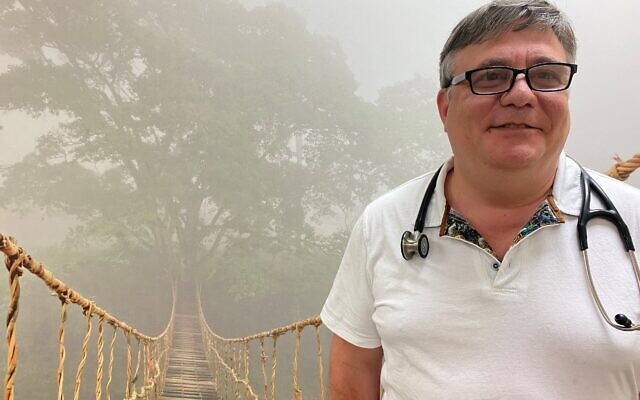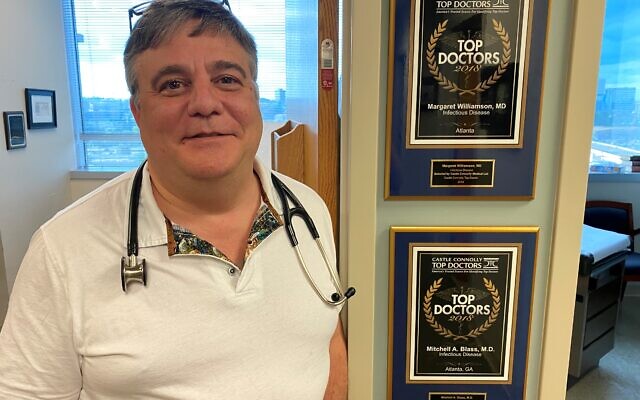Blass Lowers the Stakes on COVID: Be Mindful
Infectious disease doctor Mitchell Blass offers his latest update on the pandemic. He helps interpret the local situation and how to apply health guidelines to everyday life.
After 37 years with the Atlanta Journal-Constitution and now with the AJT, , Jaffe’s focus is lifestyle, art, dining, fashion, and community events with emphasis on Jewish movers and shakers.

With conflicting local news reports of another wave of COVID-19, countering data showing diagnoses down, Dr. Mitchell Blass offers his latest update in a series of interviews during the pandemic with the expert in infectious disease.
“In Atlanta, the downward trend has been continued and sustained for quite some time,” he said recently. “The specialized isolation tents, which were placed outside of the ER at Emory Saint Joseph’s, have not been used in weeks and were just removed.
“Undoubtedly, there will be occasional, localized, hotspots of COVID illness in Georgia and throughout the world. However, the massive and exponential rise in the number of cases seen over the first three to four months of the pandemic are, to a reasonable degree of medical certainty, not likely to occur a second time,” Blass said.
“The recent increase in case reporting is expected, largely driven by the widespread availability of testing. There is a sustained decrease in the number of hospitalizations, ICU admissions and mortality. The peak for the Atlanta metropolitan area was the third week of April,” he said.
“Cases in the U.S. have paralleled those in Europe with approximately a 12-week lag time.”

Jaffe: You have kept us abreast of your COVID patients 60, 12, now…?
Blass: I notice a continued and sustained decrease in the numbers. Friday June 12, I have only three COVID patients in the hospital. Two of these have resolved their COVID illness, remaining in the hospital for other medical reasons. The third was diagnosed this week and will be released today.
Jaffe: You are conveying a return to normalcy.
Blass: There are many variables, so what is possible today, in one region, may not be advisable concurrently in other locations. That being said, a few things are fairly certain:
Hand washing, avoiding face touching (likely one reason masks help prevent spread).
Common sense is paramount when coming into contact with others. Have fever, don’t visit grandparents.
If you have symptoms, visit a healthcare provider for evaluation and if you have a contagious disease that may be transmitted, avoid others until you have been instructed by your healthcare provider.
When an effective and safe vaccine is available (perhaps by the end of the year), take it.
Social distancing remains important, particularly in areas like hospitals, nursing homes. I hope over time, we will find it is less important in grocery stores, restaurants, barbershops.
Be mindful, not carefree.
Jaffe: Is the virus weakening over time?
Blass: I am cautiously optimistic that COVID will pass, just as SARS and MERS did. I don’t have any scientific data to support that hope, apart from historical knowledge of those epidemics which I followed closely. The idea of the virus becoming less prevalent, a term I prefer over weakening, is not related to the change of seasons. The evidence for that comes from experience in the Southern Hemisphere with COVID.
Jaffe: New cycle in the winter?
Blass: With the upcoming influenza season approaching, I cannot underestimate the importance of flu vaccination to all individuals without a significant contra-indication. It is not possible to differentiate by symptoms alone, between seasonal influenza and COVID. Neither China, nor Europe has experienced a second wave. I anticipate we will not either.
Jaffe: Summer camp?
Blass: I have enrolled son Joshua, 7, for overnight camp in Georgia this summer.
Worldwide pandemics are truly infrequent. The best we can do is use the information we learn to move forward.
Jaffe: Who should be testing now?
Blass: PCR [throat or nasal swab] testing should be performed on those who are experiencing symptoms and those prior to elective surgical interventions or other procedures. Also, PCR testing should be considered for those visiting family members or friends at high risk for mortality from COVID. The issue of PCR testing prior to camp, school or other similar venues should be considered.
Antibody [blood] testing is useful for individuals who wish to know if their immune system recognizes the coronavirus. If this virus follows the usual pattern of other viral diseases, antibody to COVID-19 should confirm some degree of immunity. While I cannot promise this, I think it’s likely.
On a lighter note, Blass says, “I should have been more mindful about COVID-25, the 25 pounds I have gained over the past 12 weeks.”



comments